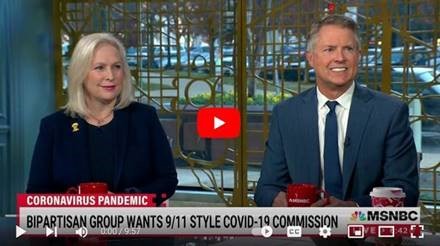Sen. Marshall Secures 9/11 Style COVID Task Force in PREVENT Pandemics Act
(Washington, D.C., March 15, 2022) – U.S. Senator Roger Marshall, M.D. today secured important provisions in the Senate’s PREVENT Pandemics Act. The legislation was voted out of the Senate HELP Committee and contains multiple provisions authored by Senator Marshall including the bipartisan 9/11 Style COVID Commission, efforts to better account for COVID natural immunity, and a prohibition on federal funding for gain-of-function research in countries of concern. Following committee passage, Senator Marshall issued this statement:
“Americans are long-overdue for a bipartisan task force investigating the origins of COVID-19, as well as finding out how we can prepare for, prevent, and recover from future global pandemics. As a physician, I think we always need to know the what, where, how, and why when giving a diagnosis. For this reason, it couldn’t be more important that we determine the origins of this infectious disease outbreak in order to ensure nothing like this ever happens again,” said Senator Marshall. “For the sake of global health, I am relieved to see the PREVENT Pandemics Act come to fruition and that it includes our COVID Commission. This comprehensive legislation is essential to addressing our vulnerabilities and preventing future crises.”
Background on Senator Marshall’s 9/11 Style COVID Commission:
Section 101, Comprehensive review of the COVID-19 response: Modeled after Senator Marshall’s 9/11 Style COVID Commission, this section establishes a Task Force to examine the initial emergence of SARS-CoV-2 and examine and assess the United States’ preparedness for and response to the COVID-19 pandemic.
- Washington Post Op–ed by Senators Marshall, Dianne Feinstein (D-CA), Joni Ernst (R-IA), and Kirsten Gillibrand (D-NY): The world deserves a thorough review of the pandemic. Congress must set up a covid-19 commission
- Senators Marshall and Gillibrand were on MSNBC’s Morning Joe to discuss their legislation. You may click HERE or on the image below to watch.

Additional Senator Marshall Provisions Included in the PREVENT Pandemics Act
- Section 231, Centers for public health preparedness and response: Modeled after Senator Marshall’s Centers for Public Health Preparedness and Response Reauthorization Act, this section reauthorizes a network of Centers for Public Health Preparedness and Response to improve communication and dissemination of scientific research.
- Section 305, National Academies of Sciences, Engineering, and Medicine Study on Natural Immunity in Relation to the COVID-19 Pandemic: Modeled after Senator Marshall’s Apply the Science Act, this section would evaluate how the U.S. Centers for Disease Control and Prevention (CDC) values scientific evidence on COVID-19 infection-acquired and vaccine-acquired immunity. Senator Marshall also led efforts to encourage the CDC to recognize natural immunity including a letter from the GOP Doctors Caucus urging the CDC to acknowledge natural immunity and numerous op-eds.
- Section 315, Federally-funded research with enhanced pathogens of pandemic potential: This section directs the Office of Science and Technology Policy to establish a federal policy for consistent review and oversight of risky research at the National Institutes of Health. This section is modeled after Senator Marshall’s shared COVID-19 origins work including the National Biosecurity Improvement Act and the Viral Gain of Function Research Moratorium Act.
- Section 505, Facilitating the use of real-world evidence: Modeled after Senator Marshall’s FDA Advancing Collection of Transformative Science (FACTS) Act, this section requires the FDA to issue or revise guidance on the use of real-world data and real-world evidence to support regulatory decision making in drugs, biologics, and medical devices.
- Section 101, Comprehensive review of the COVID-19 response: Committee accepted legislative text to remove applicability of the Federal Advisory Committee Act to the Task Force to more closely align with Senator Marshall’s bipartisan National Commission on the COVID–19 Pandemic Act.
- Section 105, Public health and medical preparedness and response coordination: Committee accepted legislative proposal to enable the Office of the Assistant Secretary for Preparedness and Response to support medical product and supply chain capacity planning. This is modeled after Senator Marshall’s draft legislation to establish a public-private partnership that would address generic drug and personal protective equipment shortages.
- Section 315, Federally-funded research with enhanced pathogens of pandemic potential: Modeled after Senator Marshall’s amendment, this section prohibits American organizations to conduct risky research capable of pandemic proportions with countries that can threaten our national security.
- Section 505, Facilitating the use of real-world evidence: Modeled after The FDA Advancing Collection of Transformative Science (FACTS) Act, this section would require the FDA to issue or revise guidance on the use of real-world data and real-world evidence to support regulatory decision making in drugs, biologics, and medical devices. In addition, Committee accepted an amendment to ensure real-world evidence would be considered for COVID-19 diagnostic test approvals.
- Section 515, Strengthening medical device supply chains: Modeled after Senator Marshall’s legislation, Committee accepted legislative text that limits HHS’ authority to require risk mitigation strategies for medical device manufacturers that make critical products essential to pandemic response.
- Section 516, Preventing medical device shortages: Modeled after Senator Marshall’s legislation, Committee accepted legislative text that would ensure medical devices needed during a pandemic (i.e. ventilators) would be required to be reported on the FDA’s device shortages list.
###
